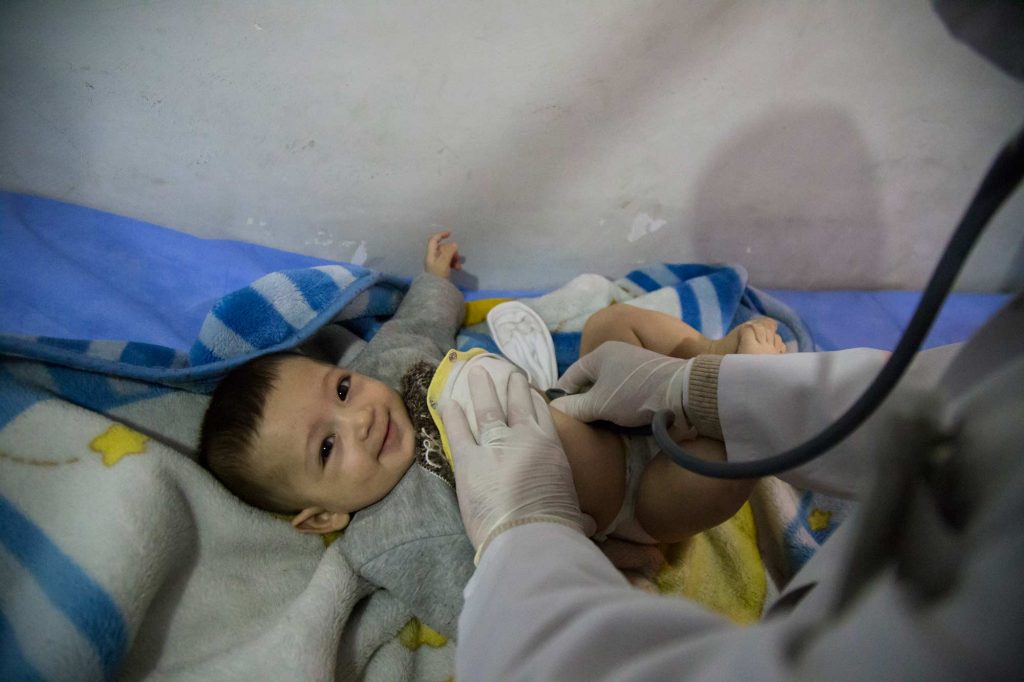
The Republic of Türkiye
On February 6, 2023, devastating earthquakes affected millions of people in Türkiye, killing 50,000 and injuring even more. Those affected included 1.7 million Syrian refugees who had fled the conflict in their home country.
International Medical Corps had a history of working in Türkiye and, working through partners, responded immediately to the quakes. Our support provided health, MHPSS, protection (including child protection and services related to violence against women and girls), distribution of non-food items, and water, sanitation and hygiene (WASH) services to address immediate needs of the women, children and men affected by the disaster.
The Challenges
Our Response
International Medical Corps worked in Türkiye from 2012 until 2018, with extensive programs in the southern areas of Gaziantep, Hatay, Kilis, Mersin and Sanliurfa. Through the help of valued partners, we resumed work in Türkiye within 24 hours of the quakes.
Healthcare
Between 2012 and 2018, International Medical Corps helped primary healthcare centers increase refugees’ access to medical services, including reproductive and maternal healthcare and mental health and psychosocial support. We provided physical rehabilitation services for Syrians living with physical disabilities, many of which were the result of war wounds. In addition, International Medical Corps established a Health Special-Needs Fund (HSNF) to make funds available to cover the cost of advanced lifesaving healthcare services for Syrians and other refugees suffering from conditions not covered by temporary-protection healthcare.
When the earthquakes hit, we partnered with local organizations—including the Association of Assistance Solidarity and Support for Refugees and Asylum Seekers (MSYD-ASRA), International Blue Crescent (IBC) and Yeryüzü Doktorları (YYD)—to provide health and mental health services. In the first year of our response, we:
- delivered 23,663 items of medicines, medical equipment and supplies to the three primary health facilities supported in Gaziantep, Hatay and Kahramanmaraş;
- provided 28,641 health consultations—including first aid, emergency care and disease prevention;
- deployed four mobile medical units and providing 1,016 people with physical therapy and rehabilitation services in Gaziantep, Hatay and Kahramanmaraş;
- procured and distributed 78 pieces of orthopedic equipment—including crutches, wheelchairs and neck braces; and
- trained 449 caregivers on how best to assist family members and friends with disabilities.
Mental health and psychosocial support
The earthquakes created both immediate and long-term mental health needs in Türkiye. Working closely with partner organizations, we responded to these needs and increased the country’s capacity to provide MHPSS services. Between February 2023 and February 2024, we:
- reached 22,454 people with integrated health and MHPSS services—including primary and emergency healthcare, physical rehabilitation and disease prevention;
- provided MHPSS consultations for 9,911 people;
- reached 10,180 children through support groups and recreational activities;
- created five safe spaces for children and adolescents;
- reached 8,980 people through psychoeducation sessions.
Moreover, before the quakes, International Medical Corps provided psychological support for refugees through partner organizations in Türkiye, including individual counseling sessions with psychiatrists, psychologists and social workers.
Water, Sanitation and Hygiene
The earthquakes caused widespread damage to water and sewage infrastructure. Even a slight gap in access to clean water, as well as sanitation and hygiene facilities, can lead to poor health outcomes and the spread of disease while exacerbating existing vulnerabilities. To address this, we:
- installed 304 latrines and sanitation facilities serving 18,305 people in eight camps in Hatay province;
- distributed 98,280 liters of drinking water to internally displaced persons (IDPs) in Gaziantep province, one of the hardest-hit areas;
- distributed essential items to 2,150 to IDPs, including blankets, food baskets, diapers, towels, hygiene and water purifications kits, and winter coats.
Protection
Syrian refugees were exposed to numerous protection risks as they fled Syria and tried to make their way in a foreign country they knew little about—especially when difficult financial situations pushed families to offer their children for child labor or early marriage. Between 2012 and 2018, International Medical Corps worked to prevent and respond to violence against women and girls in Türkiye by providing case management for existing cases, offering mental health support for survivors and helping Syrians through training and skills-building activities. We also worked with children and adolescents in community centers and child-friendly spaces while providing case management services for protection cases.
After the quakes, we worked with partners to incorporate protection services into our other work and strengthened community-based protection structures to enhance access to services for women, girls and boys.
Syrian Refugee Crisis
Since its beginnings in 2011, the Syrian war has inflicted incomprehensible levels of suffering on civilians and fueled one of the largest displacement crises in the world. International Medical Corps works in Syria—as well as in Iraq, Lebanon and Jordan, and formerly in Turkey—to provide medical care, mental health and psychosocial support, gender-based violence prevention and response, and other vital services to Syrian families whose lives have been shattered by conflict.
Earthquakes in Türkiye and Syria
A series of powerful earthquakes struck Türkiye and Syria on February 6, 2023, killing more than 50,000 people and injuring many more. International Medical Corps responded immediately to the quakes, working with partners and local governments to directly provide medical and mental health services, as well as protection, food, vital winter supplies, and clean water and sanitation.
Read moreThe Things We Carry: Stories of Syrian refugees and what they took with them when the fled home
When violent civil war erupted in Syria in 2011, millions of people fled their homes by land and sea in search of safety for themselves and their families. What did they carry as they fled?
READ MORE